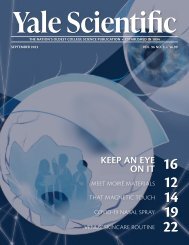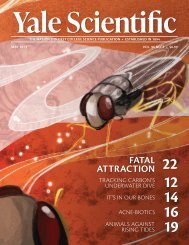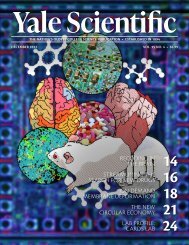YSM Issue 86.3
Create successful ePaper yourself
Turn your PDF publications into a flip-book with our unique Google optimized e-Paper software.
FEATURE
Sam Spaulding, JE ’13
BY MARGARETTA MIDURA
Not many people can say that they have communicated with robots,
worked for Disney, and graced the stages of both Jeopardy! and Who
Wants to be a Millionaire?. But for Samuel Spaulding, a senior Computer
Science major in Jonathan Edwards, this is simply the beginning of
a promising future in social robotics.
As a member of his high school math and Quiz Bowl teams,
Spaulding’s interest in science started early. His interest in artificial
intelligence, specifically, was sparked during his senior year after
reading the book Gödel,
Escher, Bach: An Eternal
Golden Braid. However, it
was only when he came
to Yale that he became
interested in computer
science.
“When I first got here,
I’d never taken a computer
science course,”
Spaulding recalled. “But
freshman year I took
this Intro Programming
class, really loved it, and
thought ‘Okay, computer
science is something that
I can really get into.’”
Drawing inspiration from
his interest in cognitive
science, Spaulding eventually
found a field that
combined both of his
interests — applying
artificial intelligence to
robotics.
At the Yale Social
Robotics lab, Spaulding’s
UNDERGRADUATE PROFILE
Spaulding spoke about the nature of intelligence at the 2013 TedxYale
Conference.
research involves finding
ways for humans and
robots to interact comfortably
with one another through spoken language. “The idea first
came when I was thinking, ‘How can you make interactions between
humans and robots more natural?’” Spaulding said. “Language is
the most natural way that humans communicate. It’s what we use
to communicate with each other. Speech technology like voice recognition
and synthesized speech weren’t good enough in the past
to justify working with, but they have been improving so rapidly
that it’s feasible to think now about this type of interaction.” Thus,
one of Spaulding’s goals is to teach robots about the environment
around them using speech.
In a project that culminated in his senior thesis, Spaulding created a
robotic system that adjusts its behavior depending on the verbal input
it gets from the user. After hearing the user describe an object, the
robot can identify the object and establish a sentiment score based
on what the user says about it. Something that the user describes in
a positive way would therefore be assigned a higher sentiment score
than something described negatively. Afterwards, the user will ask the
robot about the object at hand. For example, the robot may be asked,
“How do you feel about carrots?” The robot then selects behaviors
to execute that are socially appropriate, given the sentiment score
it has learned for carrots from the user’s description. By teaching
robots how to react to objects that they encounter, this undertaking
provides a step towards improving human-robot communication.
In addition to working in the Social Robotics Lab, Spaulding has
been putting his computer
science skills to use in various
ways. In the summer of
2011, he worked at Amazon
to develop a website that
assessed team performance.
The experience gave him
valuable programming experience
and showed him
how a standard software
engineering company functions
on a grand scale. Furthermore,
he worked on a
team to create an Android
app called SmileIKnow,
which became a finalist at
the Amazon Mobile Security
Hackathon. The following
summer, Spaulding worked
as a research assistant for
Walt Disney Imagineering.
“I was doing artificial intelligence
research for tools
that might eventually see use
in the parks,” he said.
When Spaulding is not
IMAGE COURTESY OF SAM SPAULDING
working on robots, he may
be found reading, playing
video games, or enjoying
the outdoors. As a trivia
enthusiast, he is also on Yale’s Quiz Bowl Team. “I like to keep my
skills sharp with bar trivia, go out and play on a team there,” said
Spaulding. “It’s a lot of fun.” And it pays off: he placed second in
the Jeopardy! College Championship.
Given his wide range of experiences, Spaulding had a lot to talk
about when selected to speak at the TedxYale conference this year.
Drawing upon his extensive background with artificial intelligence,
he steered away from the purely technical aspects of his research and
instead explored the unique nature of human intelligence.
Next year, Spaulding plans to continue his education at Massachusetts
Institute of Technology (MIT). Indeed, with all that he
has achieved in the past four years, Spaulding will certainly have a
busy and rewarding post-Yale career ahead of him. “I’ll be going to
graduate school at MIT for robotics, so hopefully I’ll have a lot of
opportunities there,” he said. “I’ve got some ideas for things that
I’d like to work on.”
36 Yale Scientific Magazine | April 2013 www.yalescientific.org


















